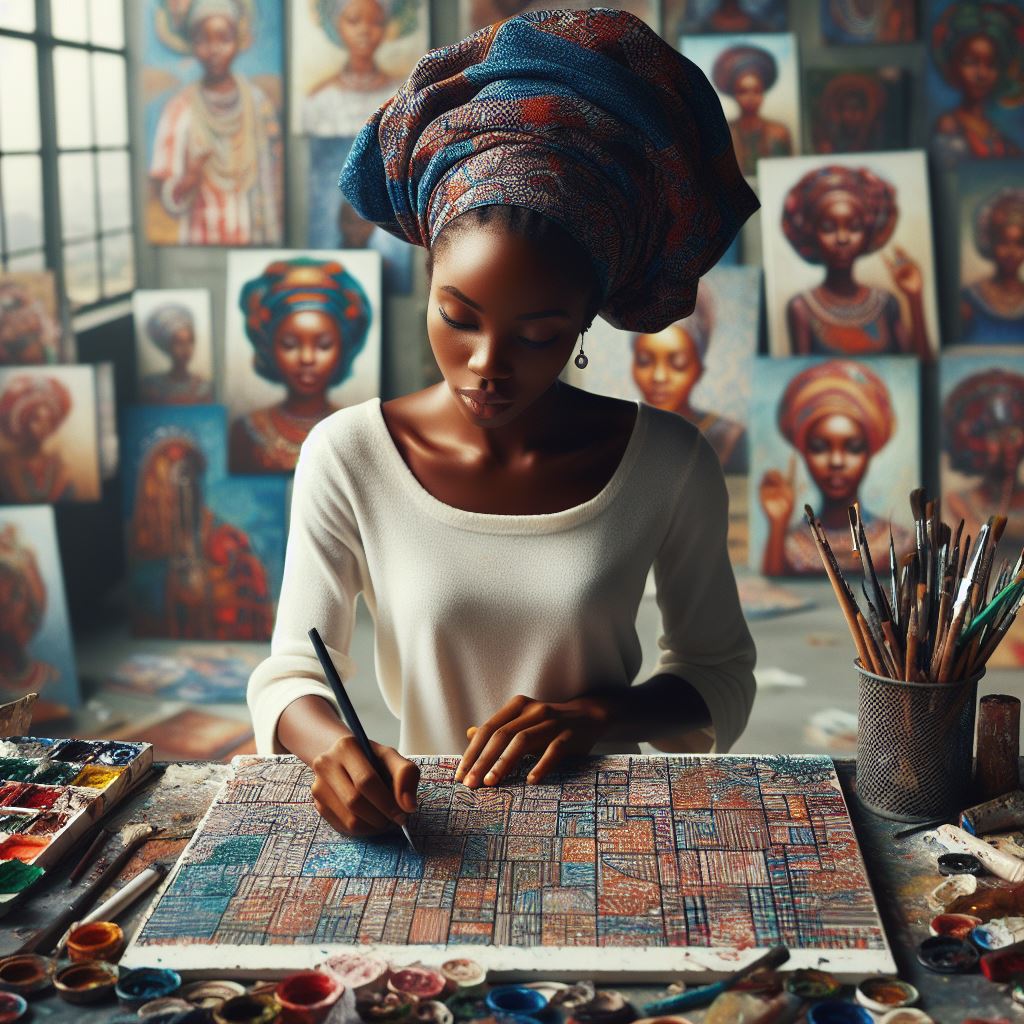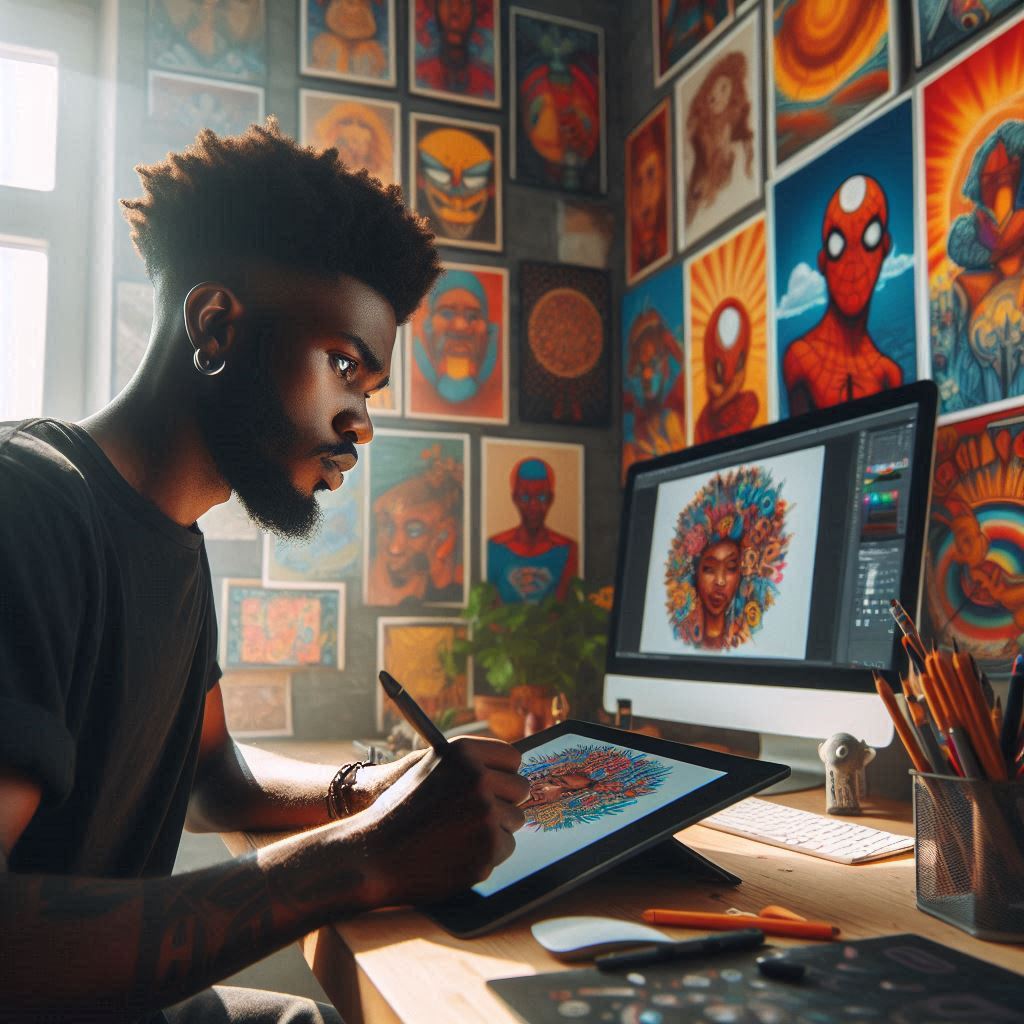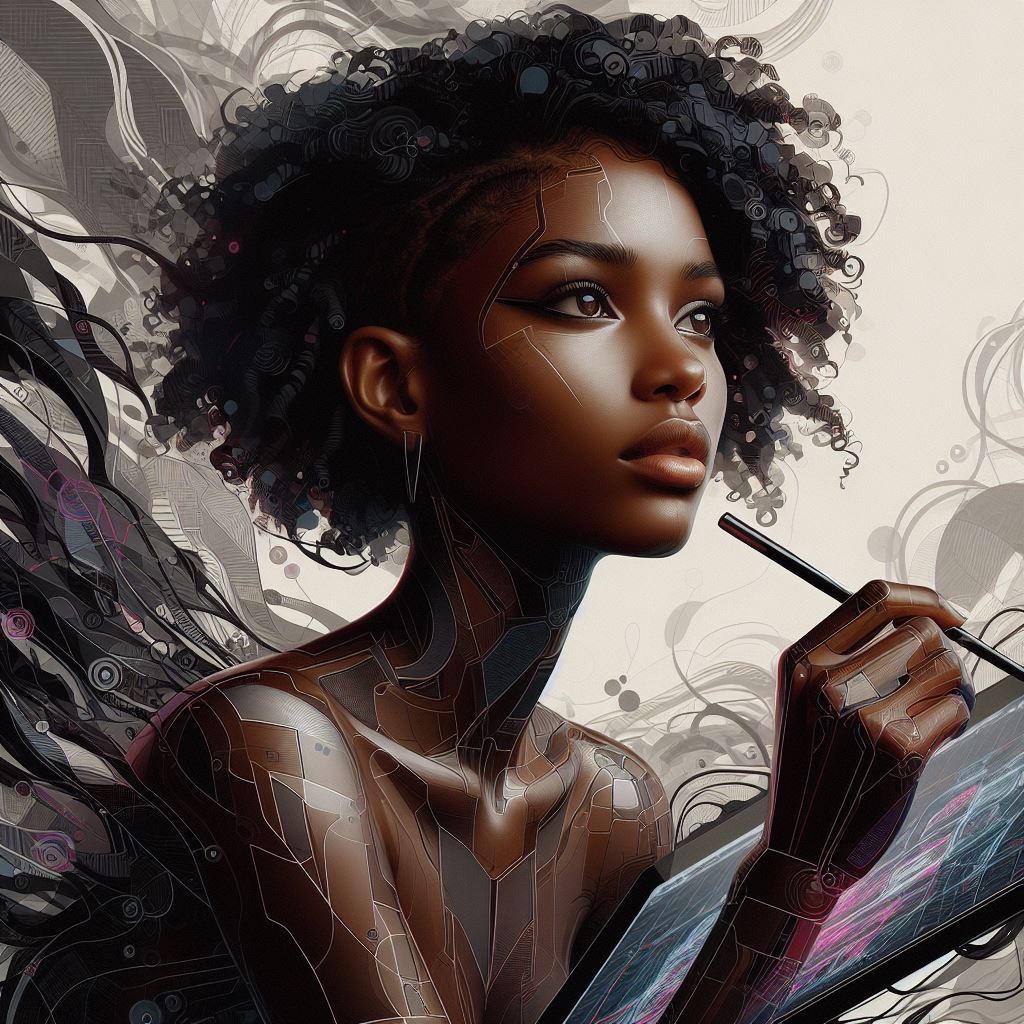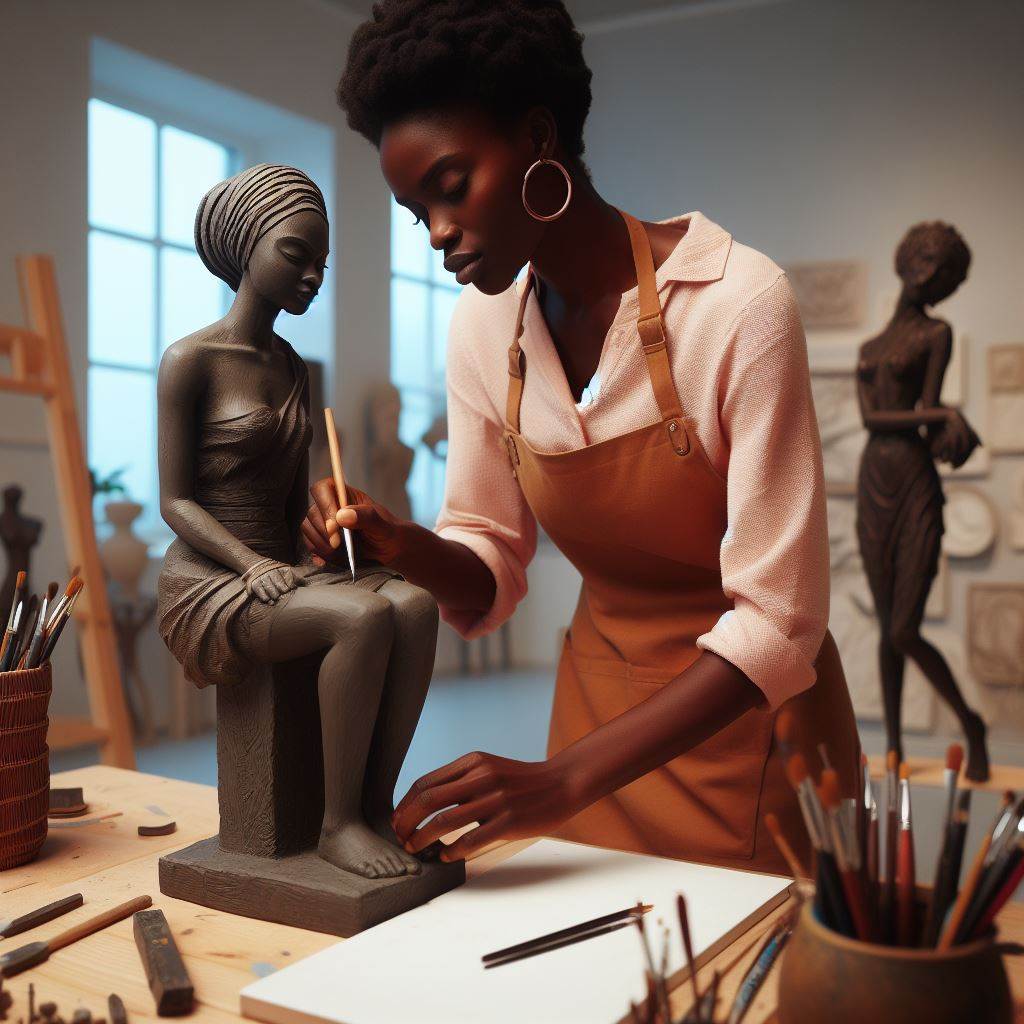Introduction
A brief overview of fine and applied art workshops in Nigeria reveals the growing interest in artistic expression in the country.
These workshops play a crucial role in promoting creativity and skill development in the art industry.
Artists from various backgrounds come together to learn new techniques and exchange ideas, fostering a vibrant creative community.
The workshops also provide a platform for emerging artists to showcase their talents and connect with potential patrons and art lovers.
Additionally, these workshops offer a space for artists to experiment with different mediums and styles, pushing the boundaries of traditional art forms.
Through hands-on experience and mentorship, participants are able to refine their skills and develop their unique artistic voice.
Furthermore, the collaborative nature of these workshops encourages artists to explore new perspectives and push the boundaries of their creative expression.
Essentially, fine and applied art workshops in Nigeria are not only a valuable learning experience but also a catalyst for innovation and growth in the art industry.
History of Fine and Applied Art Workshops in Nigeria
Origins and evolution of fine and applied art workshops in Nigeria
Fine and applied art workshops in Nigeria have a rich history that dates back to traditional art practices.
The evolution of these workshops can be traced to the diverse cultural heritage of the country, with each region having its unique art forms and techniques.
The traditional art workshops were often centered around communal activities where artists and craftsmen would gather to create art pieces for various purposes.
These workshops served as a platform for skill development, knowledge sharing, and cultural preservation.
As Nigeria transitioned into a more urbanized society, the concept of art workshops evolved to encompass a wider range of artistic expressions.
Western influences and formal art education introduced new techniques and styles to the local art scene, leading to the fusion of traditional and contemporary art practices.
Pioneers and key players in the development of art workshops in the country
Several individuals and organizations have played significant roles in the establishment and growth of fine and applied art workshops in Nigeria.
These pioneers have dedicated their lives to promoting and preserving the country’s rich artistic heritage.
- Ben Enwonwu: A renowned Nigerian artist, Ben Enwonwu, is often credited with revolutionizing the art scene in Nigeria. His works and advocacy for art education have inspired generations of Nigerian artists.
- Nike Davies-Okundaye: As a prominent Nigerian textile artist, Nike Davies-Okundaye has founded several art centers and workshops across the country. Her efforts have been instrumental in empowering local artists and promoting Nigerian art globally.
- The Society of Nigerian Artists (SNA): Established in 1963, the SNA has been at the forefront of promoting art workshops and exhibitions in Nigeria. The organization provides a platform for artists to showcase their work and collaborate with peers.
- Terra Kulture: Founded by Bolanle Austen-Peters, Terra Kulture is a cultural center that hosts art workshops, exhibitions, and performances. The center has become a hub for promoting Nigerian art, music, and literature.
- Yusuf Grillo: A prominent Nigerian painter and educator, Yusuf Grillo has made significant contributions to the development of art education in Nigeria. His influence can be seen in the numerous art workshops and institutions he has helped establish.
Therefore, the history of fine and applied art workshops in Nigeria is a tapestry of tradition, innovation, and community.
The contributions of pioneers and key players have shaped the vibrant art scene in the country and continue to inspire future generations of Nigerian artists.
Read: Digital Media Trends in Communication Arts
Types of Fine and Applied Art Workshops in Nigeria
Different Categories of Workshops
In Nigeria, fine and applied art workshops offer diverse learning opportunities.
These workshops cover various categories, including painting, sculpture, pottery, and textile design. Each category provides unique skills and techniques, enriching the artistic community.
- Painting workshops focus on techniques like watercolor, oil, and acrylic. They teach color theory, brushwork, and composition. Participants learn to express their creativity and develop their own style. These workshops often include sessions on portrait, landscape, and abstract painting.
- Sculpture workshops introduce participants to materials like clay, stone, and metal. They cover techniques such as carving, modeling, and casting. These workshops help artists understand form, space, and texture. They also provide practical experience in creating both traditional and modern sculptures.
- Pottery workshops teach the art of shaping and firing clay. Participants learn hand-building, wheel-throwing, and glazing techniques. These workshops emphasize functional and decorative pottery. They often include sessions on traditional Nigerian pottery methods and contemporary approaches.
- Textile design workshops explore fabric manipulation and decoration. Techniques include dyeing, printing, weaving, and embroidery. Participants learn to create patterns and textures on fabric. These workshops blend traditional Nigerian textile arts with modern design practices.
Comparison of Traditional and Contemporary Art Workshops
Traditional art workshops
in Nigeria focus on preserving cultural heritage. They teach age-old techniques passed down through generations.
Traditional workshops emphasize craftsmanship and the use of natural materials.
They often include storytelling and cultural education, enriching the artistic experience.
In traditional painting workshops, participants might learn ancient mural techniques or traditional body painting methods.
Sculpture workshops could focus on wood carving or bronze casting, skills integral to Nigeria’s artistic history.
Pottery workshops might teach methods like coil building or pit firing, used by indigenous potters for centuries.
Contemporary art workshops
embrace modern techniques and materials.
They encourage innovation and experimentation.
Contemporary workshops often integrate technology, such as digital tools for design and fabrication.
These workshops address current trends and global influences in the art world.
In contemporary painting workshops, artists explore mixed media and digital painting.
Sculpture workshops might include installations and new materials like plastics or recycled objects.
Pottery workshops could feature modern kilns and glazes, expanding the possibilities for ceramic art.
Textile design workshops often incorporate digital printing and new synthetic fibers.
Traditional workshops provide a deep connection to cultural roots and historical practices.
They emphasize the importance of heritage and the continuity of artistic traditions.
Contemporary workshops offer a platform for innovation and global dialogue.
They encourage artists to push boundaries and explore new artistic horizons.
Fine and applied art workshops in Nigeria offer diverse learning experiences.
Painting, sculpture, pottery, and textile design workshops cater to various artistic interests.
Comparing traditional and contemporary workshops highlights the richness of Nigeria’s artistic landscape.
Traditional workshops preserve cultural heritage and craftsmanship, while contemporary workshops embrace innovation and global trends.
Together, they provide a comprehensive art education, nurturing creativity and artistic growth.
Participating in these workshops helps artists refine their skills, connect with their cultural roots, and explore new creative possibilities.
Read: Famous Nigerian Alumni of Communication Arts Programs
Location and Accessibility of Art Workshops in Nigeria
Distribution of art workshops across various states in Nigeria
Art workshops in Nigeria are located in different states across the country, providing opportunities for artists to learn and improve their skills.
Some of the states where these workshops are located include:
- Lagos State: Lagos, being the commercial nerve center of Nigeria, is home to several art workshops that cater to both aspiring artists and established professionals. The vibrant art scene in Lagos attracts artists from all over the country.
- Abuja: As the capital city of Nigeria, Abuja is also a hub for art workshops. The serene environment and cultural diversity in Abuja provide a conducive atmosphere for artistic expression and creativity.
- Enugu: Enugu, located in the southeastern part of Nigeria, is known for its rich cultural heritage and artistic traditions. Art workshops in Enugu focus on preserving and promoting the Igbo culture through various art forms.
- Kano: In the northern part of Nigeria, Kano is a center for traditional arts and crafts. Art workshops in Kano offer a unique glimpse into the rich artistic heritage of the region, attracting artists and enthusiasts alike.
- Port Harcourt: Situated in the Niger Delta region, Port Harcourt is a melting pot of cultures and artistic influences. Art workshops in Port Harcourt showcase the diverse artistic expressions of the people in the region.
Accessibility by aspiring artists, students, and art enthusiasts
Art workshops in Nigeria are accessible to a wide range of individuals, including aspiring artists, students, and art enthusiasts.
Here are some ways in which these workshops cater to different groups:
- Open to all: Most art workshops in Nigeria welcome individuals of all ages and skill levels who are interested in learning about art. This inclusivity ensures that everyone has the opportunity to explore their creativity and artistic talents.
- Affordable fees: Many art workshops in Nigeria offer affordable fees to make art education accessible to students and aspiring artists on a budget. This affordability encourages more people to participate in workshops and improve their skills.
- Scholarships and grants: Some art workshops provide scholarships and grants to talented individuals who may not have the financial means to afford art education. These opportunities help students and artists pursue their passion for art without financial barriers.
- Networking opportunities: Attending art workshops allows aspiring artists and students to network with established professionals in the industry. These connections can lead to mentorship opportunities, collaborations, and exposure to new artistic techniques and trends.
- Online workshops: In addition to physical locations, some art workshops in Nigeria also offer online classes and workshops. This accessibility allows individuals from different parts of the country to participate in art education without geographical limitations.
Generally, the distribution of art workshops across various states in Nigeria and their accessibility to aspiring artists, students, and art enthusiasts play a crucial role in fostering creativity, skills development, and cultural exchange in the Nigerian art scene.
Read: Student Experiences: Life in Communication Arts
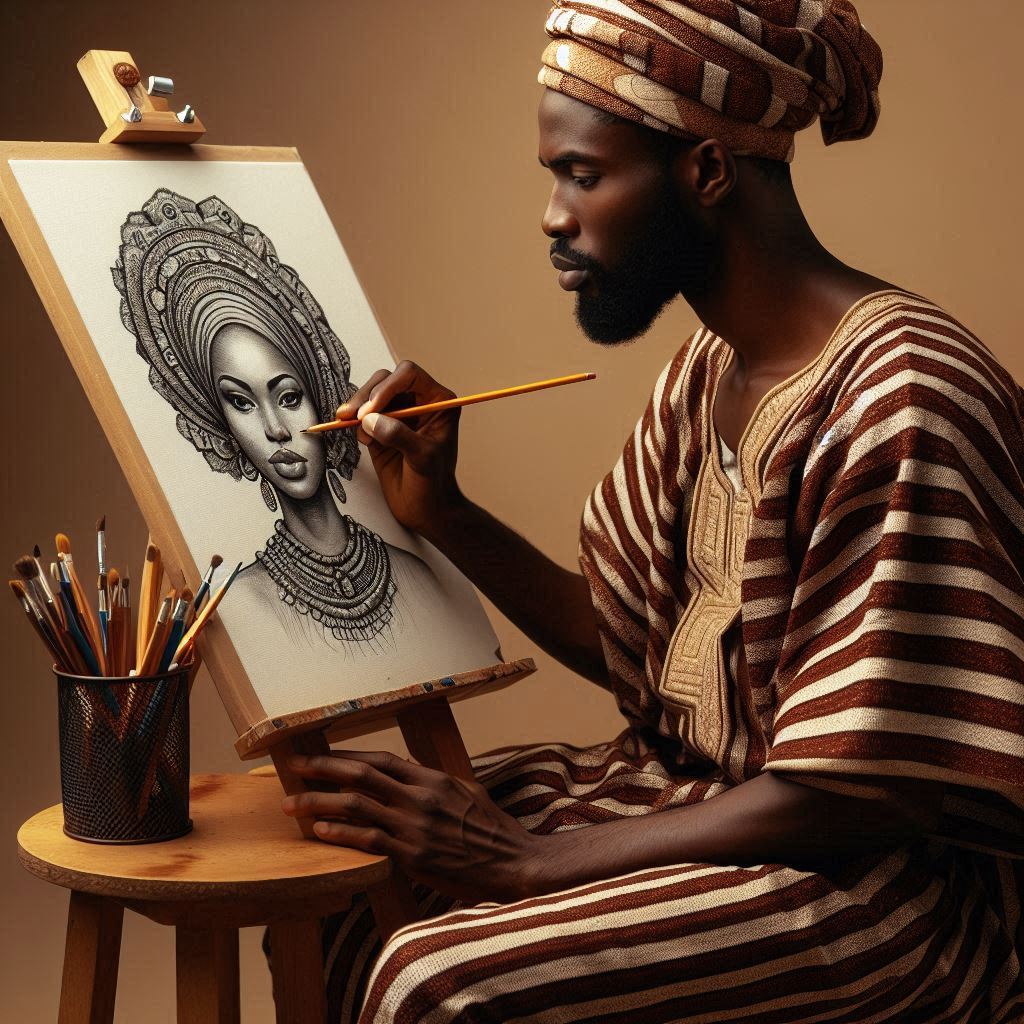
Role of Fine and Applied Art Workshops in Skills Development
Importance of Workshops in Honing Artistic Skills and Techniques
Fine and applied art workshops play a crucial role in honing artistic skills and techniques.
They provide structured learning environments where artists can focus on developing their craft. Workshops offer hands-on experience and direct instruction from experienced artists and teachers.
In painting workshops, participants learn essential techniques such as color mixing, brush handling, and composition.
These skills are fundamental for creating visually compelling artworks. Workshops also introduce artists to various painting styles and mediums, expanding their creative toolkit.
Sculpture workshops teach the basics of working with different materials like clay, wood, and metal. Artists learn techniques such as carving, modeling, and casting.
These skills are vital for creating both traditional and contemporary sculptures. Practical sessions allow artists to experiment and refine their methods.
Pottery workshops focus on skills such as wheel-throwing, hand-building, and glazing.
These techniques are essential for creating functional and decorative pottery.
Workshops also teach the chemistry of glazes and the physics of firing, which are crucial for achieving desired effects.
Textile design workshops cover techniques like dyeing, printing, and weaving.
Artists learn to manipulate fabric and create intricate patterns.
These workshops combine traditional textile methods with modern innovations, giving artists a broad skill set.
Workshops provide a supportive environment where artists can receive feedback and guidance.
This constructive criticism helps artists improve their techniques and artistic vision.
The collaborative nature of workshops also encourages the exchange of ideas and techniques among participants.
Impact on Personal and Professional Growth of Artists
Attending art workshops significantly impacts both the personal and professional growth of artists.
On a personal level, workshops boost confidence and encourage creative exploration.
They provide a space where artists can take risks and experiment with new ideas without fear of failure.
Workshops also offer a sense of community.
Artists meet peers who share their passion and challenges.
This network of like-minded individuals provides emotional and professional support.
It fosters collaborations and lifelong friendships that enrich an artist’s journey.
On a professional level, workshops enhance an artist’s resume and portfolio.
Participation in reputable workshops demonstrates a commitment to continuous learning and skill development.
This dedication is attractive to galleries, collectors, and potential clients.
Artists often gain exposure through workshops.
Many workshops culminate in exhibitions or showcases where participants can display their work.
These events provide valuable opportunities for networking and gaining recognition.
Learning from established artists and instructors can open doors to mentorship and career opportunities.
Instructors often provide insights into the art market and professional practices.
This knowledge helps artists navigate the business side of art, from pricing their work to marketing themselves effectively.
Workshops also keep artists updated with the latest trends and techniques.
In a rapidly evolving art world, staying current is essential for maintaining relevance and competitiveness.
Workshops that integrate new technologies and methods prepare artists for future challenges and opportunities.
Fine and applied art workshops in Nigeria are essential for honing artistic skills and techniques.
They provide structured learning and hands-on experience in various art forms, such as painting, sculpture, pottery, and textile design.
Workshops significantly impact personal and professional growth by boosting confidence, fostering community, enhancing resumes, and offering exposure.
They also keep artists updated with the latest trends and techniques, ensuring they remain competitive and innovative.
Participating in these workshops is a valuable investment in an artist’s career and creative development.
Read: Developing Critical Thinking in Language Arts
Contributions of Art Workshops to the Nigerian Art Scene
Influence of Workshops on the Development of Nigerian Art Culture
Fine and applied art workshops play a pivotal role in the development of Nigerian art culture.
These workshops serve as incubators for creative expression and innovation.
By bringing artists together, workshops foster collaboration and the exchange of ideas, essential for cultural growth.
Workshops often revive traditional techniques and introduce them to new generations.
This preservation of cultural heritage ensures that age-old methods and styles remain part of the contemporary art scene.
Artists learn to blend these traditional techniques with modern practices, creating unique and culturally rich artworks.
Moreover, workshops contribute to the diversification of Nigerian art.
They encourage artists to explore various mediums and styles, leading to a broader range of artistic expressions.
This diversity enhances the richness of Nigerian art culture, making it more vibrant and dynamic.
Workshops also act as platforms for discussing and addressing social issues.
Artists use these spaces to create works that reflect on society, politics, and culture.
This engagement with contemporary issues makes Nigerian art more relevant and impactful.
Promotion of Local Artists and Their Works Through Workshops
Workshops are crucial for promoting local artists and their works.
They provide artists with opportunities to showcase their talents and gain visibility.
Many workshops culminate in exhibitions or showcases, where participants can display their creations to the public.
These events attract art enthusiasts, collectors, and critics, providing exposure for emerging artists.
Exhibitions resulting from workshops often receive media coverage, further promoting the artists involved.
This visibility is essential for building an artist’s reputation and attracting potential buyers.
Workshops also facilitate networking among artists and art professionals.
Artists meet gallery owners, curators, and potential patrons during these events.
These connections can lead to exhibitions, commissions, and other career opportunities.
Additionally, workshops often collaborate with cultural institutions and organizations.
These partnerships enhance the visibility of local artists and their works.
Institutions may sponsor workshops or provide venues for exhibitions, amplifying the reach and impact of these events.
Workshops also empower artists with the skills and knowledge needed to market their work effectively.
They teach artists about pricing, presentation, and self-promotion.
This education is vital for artists to succeed in the competitive art market.
Moreover, workshops can attract international attention to Nigerian art.
By inviting international artists and critics, workshops create cross-cultural exchanges that highlight Nigerian talent on a global stage.
This international exposure can open doors for local artists to participate in global exhibitions and art fairs.
Fine and applied art workshops significantly influence the development of Nigerian art culture.
They preserve traditional techniques, promote cultural diversity, and engage with contemporary issues.
Workshops are also vital for promoting local artists and their works, providing exposure, networking opportunities, and marketing skills.
Through collaborations with cultural institutions and international exchanges, workshops amplify the visibility of Nigerian art globally.
Participating in workshops is crucial for artists seeking to contribute to and thrive within the vibrant Nigerian art culture.
Challenges Faced by Fine and Applied Art Workshops in Nigeria
Lack of funding and resources for workshops
One of the major challenges faced by fine and applied art workshops in Nigeria is the lack of adequate funding and resources.
Many workshops struggle to secure the necessary funds to operate effectively and provide artists with the tools they need to create their work.
Without proper funding, workshops may not be able to afford quality materials, equipment, and facilities, which can hinder the artistic process and limit the potential for creative growth.
Limited exposure and recognition for artists participating in workshops
In addition to financial constraints, workshops in Nigeria also face limited exposure and recognition for the artists who participate in their programs.
While there is a rich tradition of artistic talent in the country, many artists find it difficult to showcase their work on a larger platform and gain the recognition they deserve.
This lack of exposure can hinder the growth and development of artists, as well as limit their ability to connect with a wider audience and market their work effectively.
Furthermore, the lack of recognition for artists participating in workshops can also impact their ability to secure future opportunities and advance their careers in the art industry.
Without a strong support system and network of connections, artists may struggle to establish themselves in the competitive art world and overcome the challenges they face in pursuing their passion.
Overall, addressing these challenges and providing adequate support for fine and applied art workshops in Nigeria is crucial for nurturing artistic talent, fostering creativity, and promoting cultural exchange in the country.
By investing in these workshops and supporting the artists who participate in them, Nigeria can continue to build a thriving art scene and showcase the diverse talents of its creative community to the world.
Collaborations and Partnerships in Art Workshops
Efforts to collaborate with international art institutions and organizations can greatly benefit art workshops in Nigeria.
These partnerships bring a diverse range of perspectives, expertise, and resources to the table, enriching the artistic experience for both artists and participants.
Benefits of Collaborations and Partnerships
- Access to new techniques and technologies
- Exposure to global art trends
- Potential for international exchange programs
- Opportunities for artist residencies
- Increased visibility and recognition in the global art community
Impact on the Growth and Sustainability of Art Workshops
Collaborations and partnerships play a crucial role in the growth and sustainability of art workshops in Nigeria.
By working together with international institutions, these workshops can attract a broader audience, secure funding for projects, and enhance the overall quality of their programs.
Furthermore, partnerships provide a platform for artists to showcase their work on an international stage, opening up new avenues for career advancement and exposure.
This exposure can lead to opportunities for collaborations with artists from different backgrounds, fostering cross-cultural dialogue and creativity.
Through partnerships, art workshops in Nigeria can also gain access to resources and facilities that may not be readily available locally.
This can include access to specialized equipment, training programs, and networking opportunities that can help artists enhance their skills and expand their artistic practice.
Transform Your Career with Expert Guidance
Get personalized mentorship consulting that’s tailored to your unique path. Our expert advice is actionable and exclusive.
Get StartedExamples of Successful Collaborations
- An art workshop in Lagos partnered with a renowned art school in Europe to conduct a series of masterclasses on contemporary painting techniques.
- A sculpture workshop in Abuja collaborated with a gallery in the United States to organize an exhibition featuring works by Nigerian sculptors.
- A photography workshop in Port Harcourt partnered with an international photography festival to showcase the work of emerging photographers from Nigeria.
These successful collaborations not only showcased the talent and creativity of Nigerian artists but also helped to establish lasting relationships with international partners, paving the way for future collaborations and exchanges.
Basically, collaborations and partnerships with international art institutions and organizations are essential for the growth and sustainability of art workshops in Nigeria.
By leveraging the expertise, resources, and networks of these partners, workshops can elevate their programs, expand their reach, and create opportunities for artists to thrive in a global artistic landscape.
Future Prospects and Innovations in Fine and Applied Art Workshops
Trends in art workshop formats and methodologies
- Collaborative art workshops where artists work together on a single project.
- Themed workshops that focus on a specific art technique or style.
- Incorporating technology in workshops to explore digital art creation.
- Interactive workshops that engage participants through hands-on activities and discussions.
- Online workshops that allow artists to connect and learn virtually from anywhere in the world.
Vision for the future of art workshops in Nigeria, including digital and virtual platforms
As the art scene in Nigeria continues to grow and evolve, the future of art workshops looks bright.
With advancements in technology and the increasing popularity of digital art, there is a great potential for incorporating digital and virtual platforms into art workshops.
Virtual art workshops can provide access to a wider audience, allowing artists from different parts of Nigeria and beyond to participate in workshops without the constraints of physical location.
This can foster collaboration and exchange of ideas among artists, leading to the development of new and innovative art practices.
Moreover, digital tools and software can open up new possibilities for creativity and experimentation in art workshops.
Artists can explore digital art forms such as digital painting, animation, and 3D modeling, expanding their artistic horizons and pushing the boundaries of traditional art practices.
In addition, virtual reality (VR) and augmented reality (AR) technologies can revolutionize the way art workshops are conducted.
Artists can immerse themselves in virtual art environments, interact with digital art objects, and even create art in virtual space.
This can create unique and engaging experiences for both artists and workshop participants, enhancing the learning and creative process.
Overall, the future of art workshops in Nigeria holds great promise with the integration of digital and virtual platforms.
By embracing innovation and incorporating new technologies, art workshops can reach new heights, inspire creativity, and empower artists to explore new artistic possibilities.
Conclusion
Fine and applied art workshops in Nigeria hold immense importance for the art community.
These workshops provide essential platforms for learning, creativity, and cultural preservation.
They equip artists with new skills and techniques, fostering continuous growth and development.
Art workshops also serve as incubators for innovation and creativity.
They encourage artists to experiment with new materials and ideas.
This experimentation leads to the development of new art forms and styles, enriching the overall art culture in Nigeria.
Artists learn to push boundaries and explore their full creative potential.
Furthermore, workshops enhance the visibility of local artists.
Exhibitions and showcases resulting from workshops attract art enthusiasts, collectors, and media attention.
This exposure is crucial for artists to gain recognition and build their reputations.
It also helps in promoting Nigerian art on both local and international platforms.
By supporting fine and applied art workshops, we nurture the creative talents that shape our cultural identity.
We ensure that Nigerian art continues to thrive and gain recognition on a global scale.
Let’s celebrate and invest in these workshops, acknowledging their critical role in the artistic and cultural development of our nation.

